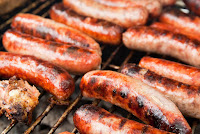Bacon, ham and sausages rank alongside cigarettes as a major cause of cancer, the World Health Organisation has said.
Its report says each 50g of processed meat a day - the equivalent of one sausage, or less than two slices of bacon - increases the chance of developing bowel cancer by 18 per cent.
Global health experts officially listed processed meat as a carsinogenic cancer-causing substance - the highest of five possible rankings, shared with alcohol, asbestos, arsenic and cigarettes.
Fresh red meat was ranked on the next level - as a "probable" carcinogen.
They said those eating a lot of processed meats should cut back, while saying the occasional bacon wrap would do little harm.
Although processed meats have been classed in the highest risk category, alongside smoking, it does not mean that each are an equal danger, experts stressed.
Dr Kurt Straif, from the International Agency for Research on Cancer, said: "For an individual, the risk of developing colorectal (bowel) cancer because of their consumption of processed meat remains small, but this risk increases with the amount of meat consumed."
Red meat - under which the IARC includes beef, lamb and pork - was classified as a "probable" carcinogen in its group 2A list that also contains glyphosate, the active ingredient in many weedkillers.
The lower classification for fresh red meat reflected "limited evidence" that it causes cancer. The IARC found links mainly with bowel cancer, but also observed associations with pancreatic and prostate cancer.
The World Cancer Research Fund (WCRF) has previously warned of "strong evidence" that consuming a lot of red meat can cause bowel cancer.
In 2009, it recommended eating no more than 2.5oz (70g) processed meat a week – the equivalent of three rashers of bacon – and said children should not have processed meat at all.
Professor Tim Key, from Cancer Research UK, said the links were backed by substantial evidence. He said the ruling should not mean cutting out all meats.
Current NHS advice is to limit intake of all meats to 70g a day, but there is no specific recommended limit for cured and processed meats.
The new advice from WHO suggests 50g of processed meat is enough to significantly raise bowel cancer risk, by 18 per cent.
Dr Ian Johnson, nutrition researcher at the Institute of Food Research, said: "Meat consumption is probably one of many factors contributing to the high rates of bowel cancer seen in America, Western Europe and Australia, but the mechanism is poorly understood, and the effect is much smaller than, for example, that of cigarette smoking on the risk of lung cancer.”
Scientists also looked at whether different cooking methods increased the risks of cancer. It found that methods such as barbecuing or pan-frying, produced more of certain types of carcinogenic chemicals.
Scientists also looked at whether different cooking methods increased the risks of cancer. It found that methods such as barbecuing or pan-frying, produced more of certain types of carcinogenic chemicals.
